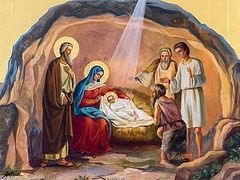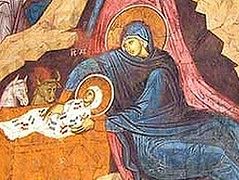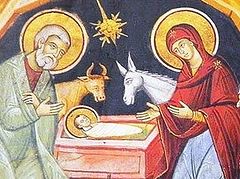 The Nativity of Christ. A mosaic at Hosios Loukas Monastery, Greece
The Nativity of Christ. A mosaic at Hosios Loukas Monastery, Greece
The feast of the Nativity of Christ rivets our attention to the Infant Christ. We glorify Him! In the semi-darkness of the cave we try to catch and scrutinize the features of this Child’s face. Bending over the rough wooden crib, we listen to His peaceful breathing attentively. But we are not alone here. And I am not speaking of Mary and Joseph—I am speaking of those who have come to bow down to the Savior before us. The Shepherds and the Wise Men have prostrated themselves on either side of the manger.
And we, along with the whole world, are among them as between two poles. The poverty of the shepherd’s knapsack is on the one pole, while there is the wealth of the Magi’s bags with gold, frankincense, and myrrh on the other pole. There is lack of schooling and simplicity on the one pole and Eastern wisdom and scholarship on the other. There is physical labor on the one pole and mental work on the other.
All of us, people with different incomes, education and occupation, will find space for ourselves here, between the Shepherds and the Wise Men. The Nativity of Christ is for everybody!
Once the Virgin Mary contained the Uncontainable, and Her womb became more spacious than the heavens. Now we are experiencing a different, yet similar miracle—the small cave of Bethlehem has expanded to such a degree that now it houses true worshippers from all over the world! We do not feel cramped here! We may feel cramped at church during the midnight service, but not here.
However, not all worshippers are genuine. After all, Herod too announced that he was going to bow down before the Child, but he lied. The Nativity of Christ is joy for those who see the King of kings, and Lord of lords (1 Tim. 6:15) in Jesus and torment for those who only see a rival in Him. And now we encounter another miracle, or an “anti-miracle”, as it were. While the cave of the Nativity is spacious enough for the entire world, Herod cannot enter it because he is a man with an unbending neck and also because he feels cramped on the same planet as Christ. “Either me or Him! No, me, me, and only me!”
And who are you? Are you a true worshipper or a true Herod?
The feast of the Nativity of Christ raises this question before us and drives us into a corner. Are we going to obey Christ just as a slave obeys his king? Do we intend to put every word of His into action? Will we reject our principles by replacing them with the commandments? Will we follow Christ, taking up the cross?
We are either Herod’s or Christ’s. We do either our will or His will. The third option is impossible just as we cannot sit down on two chairs between which a great gulf is fixed (Lk. 16:26) at the same time.
 The Nativity of Christ. A fragment of a sixteenth-century icon from Novgorod
The Nativity of Christ. A fragment of a sixteenth-century icon from Novgorod
Herods of all times seek Christ with the sole purpose of killing Him. They open the Holy Scriptures, hoping (they hope so much!) to find obvious contradictions and senselessness in it. They are so happy to see any more or less complicated places in the Bible as they find an occasion to close this book immediately, declaring that it is beyond their comprehension and continuing to live in their sins.
If you pledge, don’t hedge. If you have called yourself a Christian, then obey Christ. Otherwise your inner Herod, your old man, will enslave you. If you have come to bow to Christ today, do not turn your back on Him tomorrow. If you are going to glorify the newly-born Infant Christ, do not do it hypocritically; otherwise He will hide from you in Egypt, and all you will find will be cardboard figures in the Nativity scenes in church.
There are the Shepherds, the Wise Men, and we are among them. We see something familiar in this. As if the Lord Jesus Christ helps us to understand His commandment, be ye therefore wise as serpents, and harmless as doves (Mt. 10:16), better. Let us replace serpents by shepherds and doves by the Wise Men—I believe the result will remain the same.
The Son of God was born on earth, yet He was not separated from heaven. He is babbling like an infant in the arms of His Mother and giving commands to the archangels and angels concurrently: “Call shepherds and the Eastern Sages to Me! I want to teach My people to combine simplicity with wisdom.”
Our Christian activity should not be limited to theory, to our mind. In this case our faith is dead (cf. Js. 2:20). Neither should it be the unreflecting and automatic execution of our duties. We cannot bow down before the Infant Christ year after year without once opening the Gospel. Likewise, we cannot be absorbed in the New Testament permanently without going to church and changing our lives.
The Shepherds, the Magi… I do not feel cramped with you; I feel warm among you…



